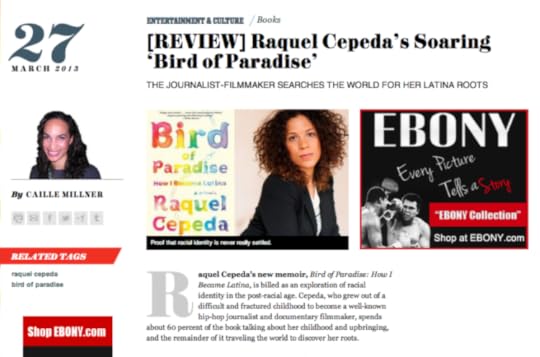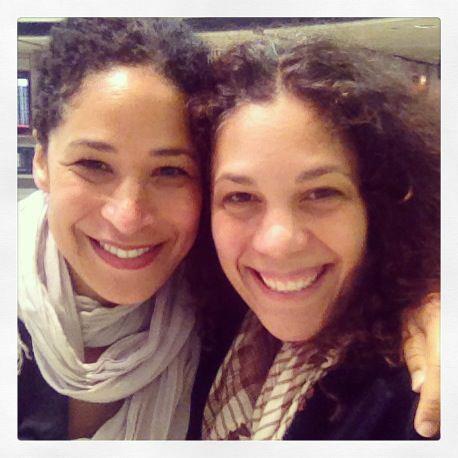Raquel Cepeda's Blog, page 10
April 23, 2013
The International Society of Genetic Genealogy reviews Bird of Paradise…
April 21, 2013
Arkansas Literary Festival
The Arkansas Literary Festival in Little Rock was, for the most part, awesome. I loved my first panel (although I wished it took place an hour later) at the Central Library. The moderator brought up an excellent question about language. Part I of Bird of Paradise… is peppered here and there with Dominican Spanish. If you read the sentences carefully you’ll find clues to their definitions within but I chose not to translate them outright because I want the readers to feel as uncomfortable as I imagine Rocío and Eduardo must have been as spanking new immigrants to New York City in the 1970s. I want the readers to walk in their shoes, even if for just a few moments. The best thing about these talks for me is hearing fresh perspectives from folks who’ve read the book and those curious about the narrative. I missed seeing a new friend’s book reading and my other homegirl Rebecca Walker, who was in town giving a talk at a local high school because I had to jet back to the airport.
I fell asleep the moment I slipped onto my seat on the plane and awoke a couple hours later in Chicago, deliriously tired, only to be happily surprised by none other than Rebecca Walker grabbing her carry-on out of the luggage compartment right in front of me. It was a serendipitous moment, indeed. We took a self-y, proof below, when we went our separate ways to catch our respective connecting flights.

April 15, 2013
Pray for Boston
We were in Boston over the weekend looking at universities with my daughter Djali Rancher as Boston marathon runners and their families were checking in to our hotel and going on practice runs around the area. It’s a sad day for everyone. From our family to yours, we are #PrayingForYouBoston.

April 11, 2013
Because it’s #ThrowbackThursday: “Snapshot of a Pseudo-Revolutionary Poetry Reading,” circa 1995
Snapshot of a Pseudo-Revolutionary Poetry Reading
Entered the room full of my brothers and sisters
Beautiful faces
Different shades of Black and Brown races
But those faces hint traces
of hate when I enter the place
Guess my hair is too straight
But I’m Black as Black as my master permitted
From Spain, the man was acquitted
Of the crimes he committed against my ancestors
Against my tatarabuela
But people give muela
When I enter the place like I was a disgrace to my race
And welcome me with shade to make me seem darker
Más oscura, que locura
nunca puede ser . . .
I say, “Peace, sis”
To the woman at the door
She snaps, “Whatever, five dollars please”
Like she was my pimp and I was her whore
Funny how our complexions were exactly the same
But she sported fashionable dreadlocks
Host is deep
Eyes glaring staring in confusion
Disillusioned if he thinks
Black is that monotonous
After the show, though
He and other pseudo-revolutionary-Peter-Pan-Africans
Cluster and talk about Black unity at the door
While drinking bottles of Heineken
Raquel Cepeda © 1995

April 10, 2013
The Miseducation of Raquel Cepeda…
April 5, 2013
The Week in Review
 Earlier this week, I had the pleasure of sitting on a panel—it started at 8:00AM!—hosted by the ACLU and Columbia Journalism Review (CJR) at the gorgeous Newseum in D.C. The panel, filmed by C-SPAN (it’s not embeddable) was a continuation of the discussion of CJR’s March/April issue package on media coverage of race, class, and social mobility. The coverstory and panel were moderated by the incomparable author and fellow Journalist-American Farai Chideya. My co-panelists were Jeff Yang, Gene Policinski and Richard Prince.
Earlier this week, I had the pleasure of sitting on a panel—it started at 8:00AM!—hosted by the ACLU and Columbia Journalism Review (CJR) at the gorgeous Newseum in D.C. The panel, filmed by C-SPAN (it’s not embeddable) was a continuation of the discussion of CJR’s March/April issue package on media coverage of race, class, and social mobility. The coverstory and panel were moderated by the incomparable author and fellow Journalist-American Farai Chideya. My co-panelists were Jeff Yang, Gene Policinski and Richard Prince.
I could barely hear myself speak, as my ears popped loudly throughout the discussion. The night before I couldn’t figure out how to turn off the AC in my hotel room and fell asleep re-reading a long article about white plight in Philadelphia that was as uninspired as it was superficial. It literally bore me to sleep. I woke up the following morning congested and with a swollen nose, rushing to make it to the venue on time.
The issue that I was most interested in was improving coverage about race, in which class and social mobility are interdependent factors. A major reason that articles like Being White in Philly and If I Were A Poor Black Kid are so banal and outrageously out of touch is because the outlets they are published in are totally gentrified. We know what happens when a community becomes gentrified: the gentry comes in and sets up shopt, builds communities atop of existing ones, rendering the native population invisible. The same can be said across the board in mainstream publishing.
We need more biological/phenotypical, sociopolitical-cultural, and gender diversity in the media—even with writers and editors who identify as white. One of the best essays about race I’ve read this year is from the perspective of a white man (Disclosure: I’m not giving David J. Leonard props because he reviewed by book for HuffPo months later. I posted the article across all social media outlets when it first came out!).
For photos from the panel, visit my Facebook page.
The Dominican Studies Institute at CUNY is near and dear to my heart for obvious reasons. I donated my book to their library earlier this week. They wrote a short review which, in part, states:
Cepeda celebrates vividly her ethnic makeup and with raving honesty; she dissects concepts of race, identity, and ancestral DNA among Latinos by using her own Dominican-American story as a specific example.
Last night I had the honor of being hosted by La Casa Azul Bookstore in East Harlem. I labored through the reading, congested and all, with those in attendance graciously sitting through it all. I cut it short because, well, I couldn’t breathe and read but I’m glad I did. The discussion that followed really informed me. The crowd was diverse and included a group of students from Trinity College in Texas (whose professor says he wants to teach Bird of Paradise… in the near future!), and folks from the community. Thank you to all those that came and a special shout-out to Casa’s… founder Aurora Anaya-Cerda for her support.
LA CASA AZUL: BIRD OF PARADISE… BOOK READING & SIGNING

April 1, 2013
“The Sisterhood of Generation I (Adult Children of Immigrants)” by Melody Moezzi
Author Melody Moezzi waxes poetic on what binds us in Bird of Paradise: How I Became Latina. She also writes about the risks children of immigrants (mostly hailing from communities of color) take writing multicultural memoirs in a convention, male-driven lit world.
“As with most risks, however, it invites criticism from more conventional voices. Case in point: Publishers Weekly, which refers to Cepeda’s language in the book as at once “street-slangy and outspoken” and “prickly and preachy.” The review describes Cepeda herself as “scrappy, street-smart, [and] quick to take offense.” I highly suspect that if she were a man, Cepeda’s “prickliness” may very well have been seen as wit and her alleged evangelism as insight. Furthermore, “quick to take offense” may just as well have morphed into “sharp and incisive.”
Read the piece HERE.

March 27, 2013
Ebony.com Reviews “Bird of Paradise”

CONTINUE READING HERE.
First of all, loving Ebony.com. It’s a really great looking site. Bravo!
Secondly, while I didn’t entirely agree with the review, mainly the idea of whether or not Bird of Paradise “settl[es] questions of racial identity,” I love how books, films, and other forms of cultural production draw something unique and thoughtful from its beholders. I look forward to discovering Millner’s work, especially seeing that it deals with gentrification (the theme of my next book).
While we’re on the subject: one’s racial and/or cultural identity is never really settled. One should rather do the work of exploring and shifting. We must never settle. We must always examine, redefine, revisit, and revise.

Apocalypse Now… Right Now!

Jenna Blum
I remember the call from my agent Ayesha Pande like it happened a few minutes ago although it went down a couple weeks prior to the March 5th launch of my book, Bird of Paradise: How I became Latina. Something in the way my phone rang felt ominous. I didn’t want to pick it up at first but I knew that whatever the deal was, I wouldn’t be alone. I already knew that Ayesha jumps into the foxhole with her clients. “Raquel,” she said in a forlorn tone, “I have some news for you: Barnes & Noble cancelled every physical order of Bird of Paradise in every single one of their stores.” Everything else she said sounded like “wa, wa, wa, wa…”
My first thought was: my book cover is so fresh and would have looked beautiful on display. Then: shit, how will people know how to find my book when it’s so hard for books by women to get reviewed by major publications, and I wonder how many women in the sliver of the proverbial pie are nonwhite aside from Sonia Sotomayor and Rita Moreno? And then I stopped thinking. I sat there, numb, as Ayesha tried her best to make sense of it all.
It turns out Barnes & Noble and Simon & Schuster, my imprint’s parent company, are involved in a dispute that has resulted in B&N pulling all the books published by S&S (except for S&S powerhouse authors Jodi Picoult and the like, though even these books are being carried in reduced numbers) off its shelves. Beyond this the details are not clear and an easy resolution doesn’t seem to be in sight.
I’m not angry with Atria books. My editor Malaika Adero is a visionary, and Judith Curr is a literary rock star who’s taken chances in the industry that have paid off handsomely. Malaika, an anomaly in the white world of publishing, overstands culture and has acquired the kinds of smart books that add a kind of flavor to mainstream book publishing that is, for the most part, missing, or worse, ghettoized.
Right now, I cannot bring myself to purchase another book, magazine or journal from B&N for the teens I mentor at a suicide prevention program in the Bronx. I feel that they, the industry’s last Goliath, are betraying readers by stymieing access to physical books, and authors by bullying publishing houses for “support.” (And really, if it’s true that B&N want S&S to spend more money on co-op and hook them up with an even deeper discount than the bookseller receives now, how will authors ever pay back their advances?!) In a recent study, writer Dennis Johnson “posited that 40% of the people who buy books online looked at them in a bookstore first.” And with an awesome book cover like mine (not to mention a discount coupon in the back for an ancestral DNA test), I was certain that readers who may have not known about it, or missed a review here or there may have picked it up out of curiosity. This is the way many readers trip into worlds they may not have understood before. This is how, over the years, I came upon books like Angela’s Ashes, Push, and Down These Mean Streets.
Yes, it’s old news that B&N stores are falling down like a once mighty stack of dominoes across the country. Almost seven hundred Borders stores have been euthanized and more than one thousand B&N’s will disappear sooner than later. Publishing houses must now rely on their marketing departments more than ever to find creative alternatives that go beyond tweeting and designing groovy Facebook banners. (Talk to almost any author and they will tell you relying on marketing is, ummm, uh…scary.) And it looks like the onus will fall on us to rewire our creative selves to think and act like corporations but, like, sans the budget. The key to a book’s success, especially those like mine that may arguably lack an Oprah book club sensibility, will rest upon how well marketing and publicity engage their authors in the early stages of planning.
A few weeks later, I’m starting to feel more optimistic about the future of my book. Bird of Paradise is a format breaker: it’s equal parts coming of age in New York City story and genetic adventure. The book isn’t only about that thing that brings us all together—family dysfunction—the bigger picture looks at what it means to be Latina and American today. Despite the violence, the betrayals, the unlearning I had to do during the process, the narrative is peppered with humor and arrives at a place that is nestled somewhere in between truth and reconciliation. It’s a hyphenated American story, the first memoir by a Dominican-American writer of my generation to be released (or withheld) in the popular market. Some people will love it, others won’t get it right away but everyone should have an opportunity, in this land of the free, to be presented with the option and decide for themselves.
In the meantime, aside from doing more outreach and supporting the fabulous independent bookstores across the country, publishers and authors need to brainstorm sooner than later about life after B&N.

SPIN Video Premiere: WHITE MANDINGOS “GHETTO IS TRYNA KILL ME”
Earlier this morning SPIN debuted my husband Sacha Jenkins SHR‘s band’s video off their forthcoming album, dropping in June. Check it out. Keep up with The White Mandingos on Facebook. They’re good for you. Trust me. I’ve heard the album.
Their debut single bears the same name as their forthcoming debut album: The Ghetto Is Tryna Kill Me, out June 11 on Fat Beats. That titular track is itself a mélange of influences — brazen punk-rock, confident hip-hop, and satire of various stripes (musical, political, racial) — and it now has a video to match courtesy of director Jason Goldwatch.













